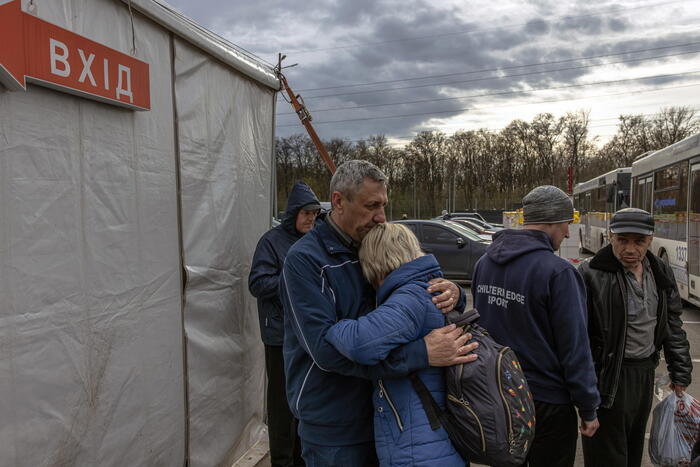"Hug me, with a lot of affection. And don't let me go."
The yellow-blue mural of a rock ballad by Okean Elzy, a Ukrainian band from Lviv, colors the entrance to the military hospital in Zaporizhzhia, a city in south-eastern Ukraine.
Inside, a man strums his guitar with a worn rocker look.
Patients, doctors and nurses enjoy the show before plunging back into a daily life made up of injuries, trauma, stretchers and pain.
"Psychological wounds are the most difficult to heal, even more than physical ones - explains Fedor, a psychologist at the military hospital -. A boy who had lost an arm in battle, for example, is better and wants to return to the front. It is different. the case of those who live under the bombings ".
Those on the front line of the battlefield arrive here in a state of agitation, some suffer from psychosis.
"Sometimes - explains the psychologist - it is necessary to take drugs. It is above all the death of friends that marks the soldiers in the depths. And then, being constantly under artillery shells".
But it's not just soldiers who pay the price for the horror of war.
At the military hospital there are many civilians affected by a conflict without rules, who are hospitalized.
"An eleven-year-old child - explains the press officer, Nikita - arrived here in serious condition, he had been shot in the face while he was fleeing Mariupol: how can you have pity in the face of this barbarism?".
In room number four, the patients don't want to talk.
They are all military, in the eyes the emptiness and the tiredness.
And then the stories of ordinary brutality that they carry inside.
"Some time ago - Nikita says - a soldier arrived here without his feet, they had them amputated. He had been captured by the invaders. He managed to save himself because there was an exchange of prisoners. Until he was released, he traveled with the leader. covered so that he did not see the path ".
Anton begins to feel the fatigue of the months spent in a state of emergency that knows no respite.
"We are tired, we work all day, every day since this damn war started", is the outburst of the bellboy of the military hospital.
"The injured arrive all the time, we give them first aid and those who need prolonged hospitalization are transferred to other hospitals".
On another side of the hospital, Dr. Jana Ishyuk sits quietly in a hospital chair, her white coat hugging her waist tightly.
She is pregnant, but she fears neither for herself nor for her baby.
And this despite the fact that it is the first time that Jana finds herself having to operate in a context of war.
"It was shocking at the beginning - she says - she. I will never forget the first injured patient I treated, but we have to put aside the emotions and do our job."
Jana would have the opportunity to leave, but she doesn't want to.
"My mother is in Italy, but I prefer to stay here, among my patients. I owe it to us, I owe it to my country".

